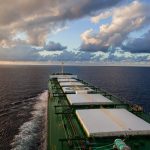Next week, the 80th meeting of the IMO’s Marine Environment Protection Committee (which focuses specifically on climate and environmental challenges related to international shipping) will take place in London. The main item on the agenda is the review of the IMO GHG strategy. Belgian and Dutch shipowners’ associations RBSA and KVNR make a compelling appeal to IMO member states to achieve a net zero target for Green House Gas emissions from international shipping by 2050: a 100% reduction across the entire value chain from well to wake.
To highlight the impact of the decision that will be taken at the MEPC 80, together with six other shipowners’ associations, the RBSA and KVNR co-signed an Op-Ed in Lloyd’s List calling for “a pragmatic and ambitious commitment with a just and equitable transition.”
The current IMO strategy dates from 2018 and had the objective of reducing 50 percent of greenhouse gas emissions from international shipping in 2050 as compared to 2008. However, this can and must be more ambitious, according to both RBSA and KVNR. The IMO should take its responsibility to help maintain the global level playing field and competitiveness as much as possible.
“The international shipowners’ community has been calling on governments for some time to declare themselves in favour of a net zero target for 2050, preferably with interim targets for 2030 and 2040,” says Celine Audenaerdt, RBSA’s Environmental Affairs Director.
KVNR’s Senior Adviser Climate & Environment Nick Lurkin adds: “More and more shipowners, their customers and financial institutions are already expecting cleaner waterborne transport. The two shipowners’ associations are therefore now jointly calling for the first time to also take this major step forward at IMO level and to accelerate the decarbonisation of shipping. We should therefore not miss this opportunity!”
IMO must facilitate without imposing unreasonable regulatory pressure
In addition to ambitious targets, it is essential that simple and clear measures are in place to reach those targets. These measures should consist of a technical measure, such as a fuel standard, supplemented by an economic measure, such as a fuel levy. The combination of both should stimulate investments in new technologies and fuels. In addition, they should help to ensure that developing countries and small island states are also included in the transition. This not only benefits those countries themselves, but also the worldwide infrastructure on shore, which is so necessary for an international sector such as shipping.
More than ever, MEPC80 is an opportunity for IMO Member States to take responsibility and set sail towards a sustainable future.
Source : Hellenic Shipping News





